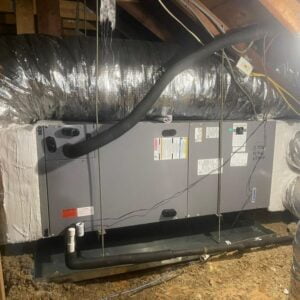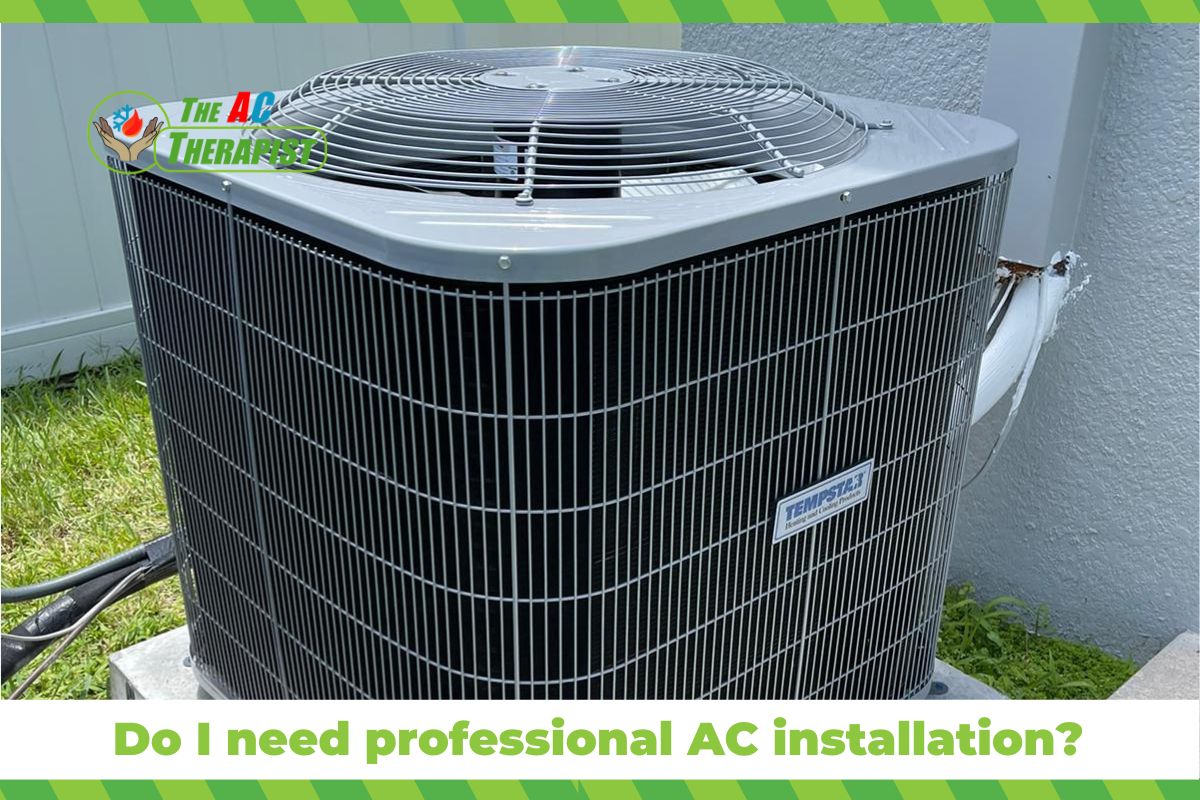Do I need professional AC installation?
As the summer heat begins to make its presence felt, having a reliable air conditioning system becomes a top priority for many homeowners.
When it comes to AC installation, a common question that arises is whether or not you need to hire a professional to get the job done.
In this detailed guide, we will explore the intricacies of AC installation, compare the pros and cons of DIY versus professional installation, and provide you with valuable insights to help you make the best decision for your specific situation.
Understanding Air Conditioner Installation.
Types of Air Conditioners
The first step in deciding whether to go the DIY or professional route is understanding the different types of air conditioning systems available in the market. Each system has unique installation requirements and varying levels of complexity. The most common types of air conditioners include:
- Central Air Conditioning System: These systems are designed to cool an entire home or building, using a single outdoor condensing unit and an indoor evaporator coil. The cooled air is distributed through a network of ducts and vents. Central AC systems require professional installation due to the complex nature of the components and the need for proper ductwork design.
- Ductless Mini-Split System: Ductless mini-split systems offer a versatile and energy-efficient alternative to central air conditioning. These systems consist of an outdoor condensing unit and one or more indoor air handlers, connected by refrigerant lines. No ductwork is required, making the installation less complex than central AC systems. However, technical expertise and specialized tools are still necessary for a successful installation.
- Window Unit: Window air conditioners are compact, self-contained units designed to cool individual rooms. They are installed directly into a window opening and do not require ductwork. Installation is relatively simple, and many homeowners can handle the task themselves. However, lifting and securing the unit into place may require assistance.
- Portable Air Conditioner: Portable air conditioners are standalone units that can be moved from room to room as needed. They do not require permanent installation and typically only need to be vented through a window or sliding door using an included vent kit. These units are ideal for temporary cooling needs or situations where other options are not feasible.
AC Installation Process
While the specific steps involved in the installation process may vary depending on the type of air conditioner, there are several key phases to consider:
- Site Selection and Preparation: Choosing the right location for both indoor and outdoor components is crucial to ensure optimal performance, energy efficiency, and ease of maintenance. Proper placement also minimizes noise and potential damage to your property.
- Mounting and Securing the Units: This involves installing brackets, supports, or other hardware required to securely fasten the indoor and outdoor units in their respective locations. Stability and security are vital to prevent damage and ensure efficient operation.
- Connecting Electrical Components: Wiring the indoor and outdoor units, as well as connecting the system to the main electrical panel, is an essential part of the installation process. This step requires knowledge of electrical wiring and strict adherence to local codes and regulations.
- Refrigerant Lines and Drainage: Connecting refrigerant lines between the indoor and outdoor units allows the transfer of refrigerant responsible for cooling the air. Additionally, a condensate drain line must be installed to remove excess moisture from the indoor unit.
- Testing and System Calibration: After all components are installed and connected, the system must be tested to ensure proper operation. This includes checking for leaks, verifying electrical connections, and calibrating the thermostat for optimal performance.

The Pros and Cons of DIY AC Installation
Before you decide to tackle AC installation on your own, it’s essential to weigh the advantages and disadvantages of a DIY approach.
Advantages:
- Cost Savings: One of the most significant benefits of DIY installation is the potential for cost savings. By handling the installation yourself, you can save on labor costs that would otherwise go to a professional installer.
- Learning Opportunity: Taking on a DIY project can provide you with valuable hands-on experience, expanding your knowledge of HVAC systems and building your skills for future projects.
- Personal Satisfaction: Successfully completing a DIY installation can provide a great sense of accomplishment and pride in your work, adding to your enjoyment of the comfortable space you’ve created.
Disadvantages:
- Complexity of the Task: AC installation can be a complex process, requiring specialized knowledge, tools, and skills. For those without experience in HVAC or electrical work, the learning curve can be steep.
- Safety Concerns: Improper handling of electrical components, refrigerants, or heavy equipment can pose serious safety risks. Injuries or accidents can occur if proper precautions are not taken during the installation process.
- Time Commitment: DIY installation can be time-consuming, especially for those who are new to the process. This can be a significant drawback for busy homeowners who may not have the time to dedicate to the project.
- Voided Warranty: Some manufacturers require professional installation to maintain the warranty on their products. Attempting a DIY installation may void the warranty, leaving you without protection if issues arise later on.
- Risk of Improper Installation: Without professional expertise, there is a higher chance of mistakes being made during the installation process. Improper installation can lead to reduced efficiency, poor system performance, and even damage to the equipment.
The Pros and Cons of Professional AC Installation
When considering hiring a professional to install your air conditioning system, it’s important to evaluate the advantages and drawbacks of this option as well.
Advantages:
- Expertise and Experience: Professional installers have the necessary training, knowledge, and experience to handle the complexities of AC installation. This ensures that the job is done correctly and efficiently, minimizing the risk of issues down the line.
- Proper Tools and Equipment: Professionals have access to specialized tools and equipment required for proper installation, ensuring a smooth process and a reliable end result.
- Time Savings: Hiring a professional can save you time, allowing you to focus on other tasks or simply enjoy the comfort of your newly cooled space without the stress of installation.
- Warranty Protection: Many manufacturers require professional installation to maintain product warranties. Hiring a professional can ensure that your investment is protected in case of future issues with the system.
- Better System Performance: Properly installed systems typically perform more efficiently and effectively, providing better temperature control, energy savings, and overall comfort.
Disadvantages:
- Higher Upfront Cost: Professional installation comes with higher upfront costs due to labor fees. This can be a deterrent for budget-conscious homeowners.
- Limited Control Over the Process: Hiring a professional means relinquishing control over the installation process, which may be a disadvantage for homeowners who prefer to be hands-on with home improvement projects.

Factors to Consider When Deciding Between DIY and Professional AC Installation
To make an informed decision about whether to install your air conditioner yourself or hire a professional, consider the following factors:
- Your Skill Level and Experience: Assess your familiarity with HVAC systems, electrical work, and general home improvement tasks. If you have limited experience, a professional AC installation may be the better option.
- The Type of Air Conditioner: The complexity of installation varies depending on the type of AC unit. For example, window units are relatively simple to install, while central air conditioning systems require more expertise. Consider the installation requirements of your chosen system when making your decision.
- Your Budget: Determine how much you are willing to spend on the installation process. If cost savings are a priority, a DIY installation may be more appealing. However, it’s essential to consider the potential risks and long-term costs associated with an improper AC installation.
- Time Constraints: Consider the time commitment required for a DIY installation. If you have a busy schedule or would prefer to have the installation completed quickly, hiring a professional might be the better choice.
- Local Regulations and Permits: Some local jurisdictions require permits for air conditioner installation or mandate that the work be performed by a licensed professional. Research the regulations in your area to ensure compliance.
- Warranty Requirements: Review the warranty terms for your air conditioning system to determine if professional AC installation is required to maintain coverage. Choosing a DIY installation may void your warranty, leaving you unprotected in the event of future issues.
Tips for Choosing the Right Professional AC Installer
If you decide to hire a professional for your AC installation, follow these tips to ensure you select the best installer for the job:
- Get Recommendations: Ask friends, family, or neighbors for recommendations of reputable HVAC professionals in your area. Personal referrals can help you find a trusted and experienced installer.
- Verify Licensing and Insurance: Check that the installer is licensed and insured to perform air conditioner installations in your area. Licensing ensures that the professional has met industry standards for training and expertise, while insurance protects you in case of damage or injury during the installation process.
- Read Reviews and Check Ratings: Research potential installers online by reading reviews and checking their ratings on platforms such as Google. This can give you a sense of the installer’s reputation and the quality of their work.
- Compare Quotes: Obtain quotes from multiple installers to compare pricing and scope of work. This will help you find the best value for your investment.
- Ask for References: Request references from potential installers and contact them to ask about their experiences with the installer. This can provide valuable insights into the installer’s professionalism, work quality, and customer service.
- Evaluate Communication and Customer Service: Assess how responsive and communicative the installer is during the initial consultation and quote process. A professional who is attentive to your needs and willing to answer questions is more likely to provide a satisfactory AC installation experience.

How much does AC installation cost?
The cost of AC installation varies depending on several factors, such as the type of air conditioning system, the complexity of the installation, the size of the space being cooled, and the geographic location. On average, the cost of installing a central air conditioning system ranges from $5,000 to $10,000, while ductless mini-split systems typically cost between $1,500 and $8,000.
Window units and portable air conditioners, which are easier to install, generally have lower installation costs. For window units, the cost might range from $150 to $500, while portable air conditioners typically require minimal installation costs as they only need to be vented through a window or sliding door.
Keep in mind that these costs can vary significantly based on factors such as labor rates in your area, the specific brand or model of the system, and any additional work needed, such as ductwork modification or electrical upgrades. To get an accurate estimate for your specific situation, it’s recommended to consult with a professional HVAC contractor and obtain multiple quotes.
How long should an AC install take?
The duration of an AC installation depends on various factors, including the type of air conditioning system, the complexity of the installation, and the experience of the installer. Here is a rough estimate of how long each type of installation may take:
- Central Air Conditioning System: Installing a central air conditioning system is generally the most time-consuming process, as it involves connecting the system to the ductwork and potentially upgrading the electrical system. For a new installation or a complete replacement, it can take the whole day for a team of 4 skilled techs. However, if the ductwork and electrical systems are already in place and compatible, it might take about 6 hours.
- Ductless Mini-Split System: The installation of a ductless mini-split system usually takes less time compared to a central air conditioning system. For a single-zone system, the installation may be completed within 5 hours. However, for multi-zone systems or more complex configurations, the installation could take the whole day.
- Window Unit: Installing a window air conditioner is typically the quickest and easiest process. Most window units can be installed within a few hours or less, depending on the specific unit and the installation location.
- Portable Air Conditioner: Portable air conditioners require minimal installation, as they only need to be vented through a window or sliding door using the included vent kit. This type of installation can usually be completed in under an hour.
Please note that these timeframes are general estimates and can vary depending on the specific circumstances of each AC installation. To get a more accurate estimate for your AC installation, consult with a professional HVAC contractor.

What size AC do I need for my home?
To determine the appropriate size of a central air conditioner for your home, you’ll need to consider the cooling capacity required to maintain a comfortable temperature. Cooling capacity is measured in British Thermal Units (BTUs) per hour or in tons (1 ton = 12,000 BTUs per hour). Here are some general guidelines to help you determine the right size for your home:
- Calculate the square footage: Measure the length and width of each room in your home that you want to cool, then multiply these dimensions to find the square footage of each room. Add up the square footage of all the rooms to get the total square footage to be cooled.
- Estimate the basic cooling capacity: As a rule of thumb, you’ll need roughly 25-30 BTUs per square foot of living space in moderate climates. For example, if your home has a total of 2,000 square feet, you would need a cooling capacity of 50,000 to 60,000 BTUs per hour (25-30 BTUs x 2,000 sq ft). Adjust this number based on your local climate, insulation, and the number of windows in your home.
- Adjust for specific factors: Various factors can influence the cooling capacity needed, such as the number of occupants, sun exposure, and the presence of heat-generating appliances. For instance, add 600 BTUs for each additional person above two occupants, or increase the capacity by 10-20% for heavily shaded or sunny rooms.
- Use the Manual J calculation: To obtain a more accurate estimate of the required cooling capacity, consider having a professional HVAC technician perform a Manual J load calculation. This industry-standard method takes into account various factors, such as the size, layout, insulation, windows, and construction materials of your home, to provide a precise recommendation.
Keep in mind that choosing the right size air conditioner is crucial for maintaining comfort and energy efficiency. An undersized unit may struggle to cool your home effectively, while an oversized unit can lead to higher energy bills, excessive humidity, and uneven temperatures.
It’s always best to consult with an experienced HVAC professional to ensure you select the appropriate size before starting your AC installation.
Make the Right Choice for Your Air Conditioner Installation.
In conclusion, deciding between a DIY air conditioner installation and hiring a professional depends on a variety of factors, such as your skill level, the specific type of AC system, your budget, local regulations, and warranty requirements. While a DIY installation can be a cost-effective and rewarding experience for some, it may not be suitable for everyone due to the risks and challenges involved. Opting for a professional AC installation ensures a seamless process, adherence to safety standards, warranty protection, and optimal system performance.
To guarantee the best possible outcome for your air conditioning installation, consider hiring the highly skilled and experienced team at The AC Therapist. With a strong reputation for providing exceptional customer service, The AC Therapist’s licensed and insured professionals have the expertise to handle all types of air conditioning installations, ensuring that your investment results in a comfortable and energy-efficient home environment. By choosing The AC Therapist, you can have peace of mind knowing that your air conditioning system will be installed correctly, maximizing its lifespan, efficiency, and overall performance.
Take the guesswork out of your AC installation and trust the experts at The AC Therapist to deliver top-quality service tailored to your unique needs. For more information or to schedule a consultation, visit our website or contact us today. Experience the difference that The AC Therapist’s commitment to excellence can make in your home’s comfort and enjoy a worry-free summer season.









